Related Research Articles

Jules Adolphe Aimé Louis Breton was a 19th-century French naturalist painter. His paintings are heavily influenced by the French countryside and his absorption of traditional methods of painting helped make him one of the primary transmitters of the beauty and idyllic vision of rural existence.

Louis-Léopold Boilly was a French painter and draftsman. A creator of popular portrait paintings, he also produced a vast number of genre paintings documenting French middle-class social life. His life and work spanned the eras of monarchical France, the French Revolution, the Napoleonic Empire, the Bourbon Restoration and the July Monarchy. His 1800 painting Un Trompe-l'œil introduced the term trompe-l'œil, applied to the technique that uses realistic imagery to create the optical illusion that the depicted objects exist in three dimensions, though the "unnamed" technique itself had existed in Greek and Roman times.

Joseph Guy Marie Ropartz was a French composer and conductor. His compositions included five symphonies, three violin sonatas, cello sonatas, six string quartets, a piano trio and string trio, stage works, a number of choral works and other music, often alluding to his Breton heritage. Ropartz also published poetry.

Loïc Gwenc'hlan Le Scouëzec was a Breton medical doctor, writer, and Grand Druid of Brittany.
Edgar Melville Ward (1839–1915) was an American genre painter.

Eugène François Marie Joseph Devéria was a French Romantic history painter, portraitist and muralist.

Jacques-Henri Sablet was a Swiss-French painter, part of a family of artists of Swiss origin. He was also known as Franz der Römer, Giacomo Sablez, Giacomo Sablé, Jacob Henry Sablet, Sablet le Jeune, Sablet le Romain or le peintre du Soleil.
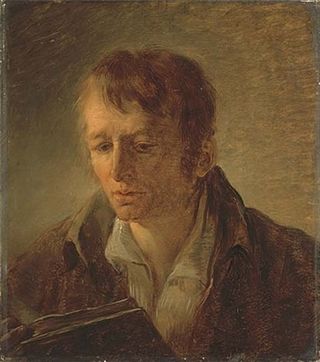
Simon-Joseph-Alexandre-Clément Denis was a Flemish painter active primarily in Italy.
Joseph-Marie Lo Duca was an Italian-born journalist, novelist, art critic, and film historian best known as the co-founder in 1951 of the influential French magazine Cahiers du Cinéma with André Bazin, Jacques Doniol-Valcroze, and Léonide Keigel.

Henri Paul Royer was a French painter, remembered especially for his genre works from Brittany. A painter of genre, portraitist and landscape artist, he travelled both in America and Europe during his life.

Charles Filiger was a French Symbolist painter. He was one of the artists who associated with Gauguin at Pont-Aven in Brittany.

Philippe-Auguste Jeanron was a French painter, curator and writer. Throughout his life he was a passionate republican. His genre pictures typically depicted common people. He opposed the July Monarchy. After the February Revolution of 1848 was made head of National Museums and Director of the Louvre, where he introduced important innovations in the preservation, classification and arrangement of the collections. Later he became director of the museum in Marseilles.

Alfred Guillou was a French painter of Breton heritage.
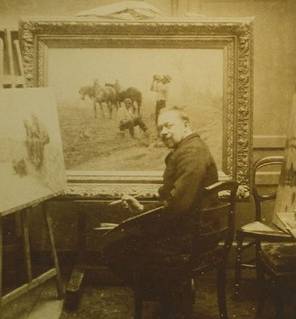
Georges Philibert Charles Maroniez was a French painter, specializing in landscapes with figures.

Henri Guinier was a French portrait and landscape painter.
Jean-Baptiste Jules Trayer was a French painter. He signed his works "Jules Trayer".
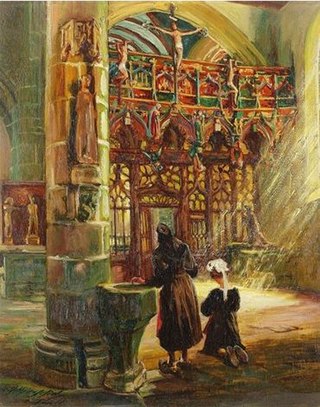
Arthur Midy was a French landscape and genre painter.
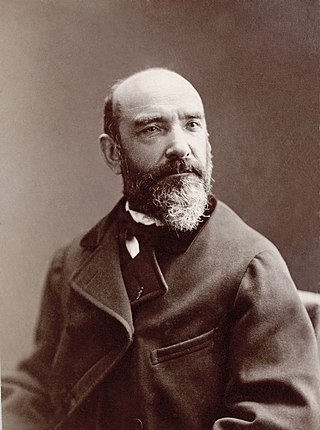
Adolphe Pierre Leleux was a French painter and illustrator. His brother Armand Leleux was also a painter.
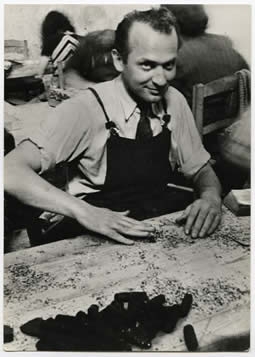
Jacques Hérold was a prominent surrealist painter born in Piatra Neamț, Romania.
Slavko Kopač was a French painter, sculptor and poet.
References
- ↑ Explication des ouvrages de peinture, sculpture, architecture, gravure, etc ..., By Société des artistes français. Salon, 1881, page 173.
- ↑ Dizionario degli Artisti Italiani Viventi: pittori, scultori, e Architetti., by Angelo de Gubernatis. Tipe dei Successori Le Monnier, 1889, page 377.